In order to turn his nation into a powerful aggressor, Hitler had to first reclaim everything that had been so recently taken away from his country. He was assisted in this by the very British, French, and American nations that had raked Germany over the coals at Versailles.
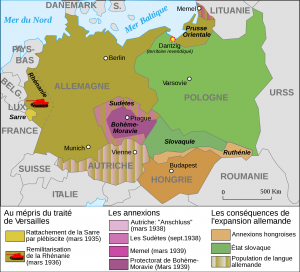
The Saar region was the first territory the Fuhrer returned to the fold of the Third Reich. Once part of Germany, this area had been governed under a League of Nations mandate since 1919, and control of its coal mines had been given to the French as part of reparations payments. The residents of the Saar had lived under this regime for 16 years and no one had ever been interested in their opinion about the situation. And then suddenly they were asked to decide whether they wanted to join Nazi Germany, democratic France, or remain under the control of the League of Nations.
At first glance there seems little to quibble about. Only minor details, a few trifles arouse suspicion. Nazi Germany unleashed a furious propaganda campaign among the population of the region and even in France itself. But no agitation was seen from Paris. What’s more, the French Minister of Foreign Affairs, Pierre Laval, claimed two days before the referendum that “France is not interested in its outcome.” It is not hard to imagine what an impression that must have made on the groups of Saar residents who were leading the fight for annexation to France. British diplomats contributed their mite as well. They took a very “strange” position by strongly objecting to the idea of the Saar remaining under the administration of the League of Nations. The British claimed that this was an overwhelming burden for that precursor to the modern UN. Thus, the outcome of the January 13, 1935 referendum was a foregone conclusion. In the end, 90% voted for reunification with Germany.
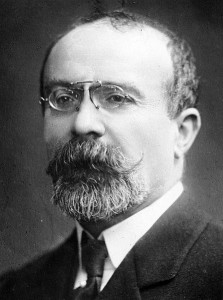
Shortly before that, the French foreign minister, Louis Barthou, who, to Great Britain’s dismay, had urged the strict containment of Hitler, was mysteriously murdered in Paris. The policies of LouisBarthou, who had been assigned the foreign affairs portfolio in February 1934, were a preparation for a new world war. For example, he notified the chairman of the Geneva Disarmament Conference, Arthur Henderson of Britain, of Germany’s non-acceptance of armaments “parity.” In April 1934, he visited Warsaw and Prague. While Poland and Czechoslovakia were ready to strike Germany from the back, Paris could sleep soundly. Upon his return, Barthou put forward the idea known as the “Eastern Pact,” which guaranteed the safety of not only Western, but also Eastern Europe. As a result, at the behest of the French, the Soviet Union was invited to join the League of Nations on September 15, 1934. In all that he did, Louis Barthou worked to circumvent the empowering of Nazi Germany. By the end of September of that same year, he drafted a comprehensive treaty, under which France, Italy, Yugoslavia, Czechoslovakia, and Romania were to jointly ensure the independence of Austria. As a result, on Oct.9, 1934, Barthou was “accidentally” killed when the Yugoslavian King Alexander was assassinated by a Croatian terrorist while visiting France.
Could Hitler have been stopped? Yes. To do this, the French and British governments needed to block the Saar referendum in January 1935. Germany would have been helpless to object as she had no tanks, airplanes, or soldiers. But nonetheless, they were all eager to play along with Hitler. Indeed, this was a very important first success for the Nazis, who then went on to experience triumph after triumph.
Let us note one obvious fact: Adolf Hitler was a “brilliant politician” so long as his Western counterparts were willing to play a loser’s game while posturing, furrowing their brows, and blustering.
On June 18, 1935, the “Ambassador Extraordinary and Plenipotentiary of Germany,” Joachim von Ribbentrop signed the Anglo-German Naval Agreement in London with the British foreign minister, Samuel Hoare,[1] under which Germany could now legally build warships, provided that “the total tonnage of the German fleet shall never exceed a percentage of 35 of the aggregate tonnage of the naval forces, as defined by treaty, of the Members of the British Commonwealth of Nations.” Under the Treaty of Versailles Germany was forbidden to possess submarines. Now the Germans had been given the right to build submarines up to 45% of the tonnage of the British submarine fleet. If Germany wanted to exceed this limit, she had to inform the British government of her decision. This resulted in a very provocative situation, in which Germans were given final authorization for the construction of new German submarines not in Berlin, but in London!
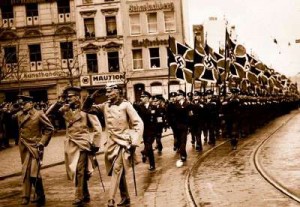
Sensing the West’s conciliatory position, Hitler began to behave more boldly and the “Hanfstaengls” surrounding the Fuhrer assured him that he could continue to act with complete impunity. On March 7, 1936, he sent German troops into the demilitarized Rhineland. No power had the right to maintain troops in this area that had been severed from Germany in order to create a buffer zone between that country and France. And yet Hitler brazenly violated international agreements. Why was he so confident that he was safe from retaliation?
Why was Hitler so confident that the French would behave contrary to their most basic instincts for self-preservation? Why did he decide to put everything at stake? After all, an exchange of fire with a single French squadron would have forced him to withdraw his troops, resulting in a loss of face and his possible ouster. The answer can be found in a book by Raymond Cartier published immediately after the war in 1948. Hitler believed that France had lost its independence and had become a subordinate power. “The Fuhrer,” claimed Goering, “often said that France undertakes nothing without the approval of England and that Paris had become a diplomatic subsidiary of London. Consequently, it was enough to smooth things over with England, and all would be fine in the West.”[2]
Hitler knew that France would undertake nothing. Hitler used secret channels to discuss all his “brazen” steps in advance with the British government before he set them into motion – this was his “genius” in a nutshell.
Could Hitler have been stopped? Yes. To do that would have required agreements to serve him with ultimatums and nip Nazism in the bud. Then not a single bomb would have fallen on London or Paris, millions of people could have been kept out of concentration camps, and the Jews and Gypsies of Europe would not have been subjected to mass extermination. But if Western democracies had taken a hard line, Hitler would not have been able to launch an attack on Russia, his main target.
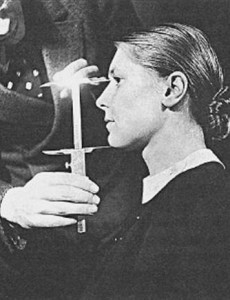
And to give him the opportunity to reach that goal, the “progressive humanity” of the time were oblivious to the Nazis’ crimes and deaf to the evidence of their attitude toward human life. And by the end of 1935 there was plenty of such proof. In September of that year Nazi Germany adopted the Nuremberg Laws, the name later given by historians to two pieces of legislation: the “Reich Citizenship Law” and the “Law for the Protection of German Blood and German Honor,” which were announced at an NSDAP rally and then unanimously adopted by the Reichstag. They once and for all revealed the racist core of the Nazi philosophy. According to the second statute, the “Reich Citizenship Law,” citizenship could only be held by one possessing “German or related blood, who proves by his conduct that he is willing and fit faithfully to serve the German people and Reich.” Thus, with a stroke of a pen, all German Jews (and there were over half a million of them in the country) were instantly deprived of German citizenship.
None of these insane Nazi decrees were kept secret from the global public. These were the completely official laws of German state. Compliance was monitored, and violation was punishable by fine or imprisonment. And how did the international community respond to this barbarism? With protests?With boycotts and a rupture in diplomatic relations?
The political elite of that time reacted quite oddly.
Germany was entrusted with the 1936 summer Olympic Games.
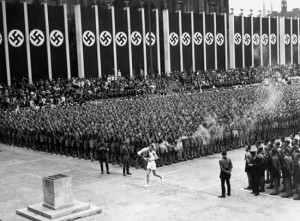 This was an expression of support and a continuation of the deliberate, loser’s game the global political elite were playing with the Fuhrer. The rules of this fixed match were very simple: Hitler was to do what was required of him (to rearm and prepare for war with the Soviet Union), and he would be provided with cash, the return of the country’s lost territories, and political prestige.
This was an expression of support and a continuation of the deliberate, loser’s game the global political elite were playing with the Fuhrer. The rules of this fixed match were very simple: Hitler was to do what was required of him (to rearm and prepare for war with the Soviet Union), and he would be provided with cash, the return of the country’s lost territories, and political prestige.
In return, no notice would be made of either the oppression of the Jews or the insane racial laws. That was the policy. And today we often observe a cynical and quite blatant picture of “human rights activists” who only notice what is momentarily beneficial to their financial backers, while disregarding what they have no need to see …
And so the Olympics took place! Swastika flags fluttered in the stadiums and German hearts were filled with pride for their country and respect and gratitude toward Adolf Hitler. When he appeared at the opening ceremony the entire stadium stood. Right hands shot into the air in the Nazi salute. Next to Hitler stood members of the International Olympic Committee in their black suits with their gold chains across their chests. The walls shook with a thunderous “SiegHeil!”
And Nazi Germany strode with confidence onto the world stage.
END NOTES
[1] Samuel John Gurney Hoare, Viscount Templewood, was a remarkable individual. In 1917 he was head of the British Secret Intelligence Service in Russia and went to great lengths to contribute to the events in St.Petersburg in February and October of that year. In 1935 he carried out a new assignment for his native land by assisting Adolf Hitler to quickly restore Germany’s military might. In 1939 he became the British ambassador to Spain, a country through which the Nazis retained contacts with the Western world. Samuel Hoare was central to all these events.
[2]Cartier, Raymond.Les secrets de la guerre devoilés par Nuremberg. Pgs.43-44.
ORIENTAL REVIEW publishes exclusive translations of the chapters from Nikolay Starikov’s documentary research ““Who Made Hitler Attack Stalin” (St.Petersburg, 2008). The original text was subject to minor cuts by the OR editorial.
PREVIOUS EPISODES
Episode 11. A Soviet Quarter Century (1930-1955)
Episode 10. Who Organised the Famine in the USSR in 1932-1933?
Episode 9. How the British “Liberated” Greece
Episode 7. Britain and France Planned to Assault Soviet Union in 1940
Episode 6. Leon Trotsky, Father of German Nazism
Episode 5. Who paid for World War II?
Episode 4. Who ignited First World War?
Episode 3. Assassination in Sarajevo

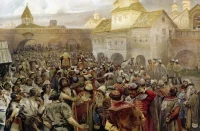












Pingback: Sochi: bringing Olympic spirit back to the Games | Oriental Review
Pingback: Sochi: Bringing Olympic Spirit back to the Games. The West’s Media Campaign against Russia — 1389 Blog - Counterjihad!
Olympics awards are made years in advance.
According to Wikipedia, Berlin won its bid to host 1936 Games over Barcelona on 26 April 1931, 2 years before Hitler came to power.
Samuel Hoare was apparently appointed British ambassador to Spain in 1940.
Pingback: Sochi Winter Olympics: the media campaign against Russia | Friendship First, Competition Second – An Amateur Sport Website
Any little things are important.
In fact, a lot depends on such little things, I know and understand it myself, so I can say from myself that it is necessary to think about it at leisure. We even had an essay on this topic at the university and I had to immerse myself in this material. I can say for sure that it is necessary to think about it and study the appropriate materials https://studydriver.com/trifles-essay/ , so be sure to think about it and read about it here, if you are also interested. I hope that somehow I could help with this. Good luck and success!